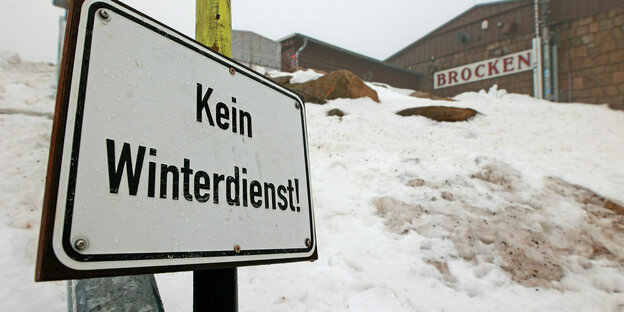Luckily, in the “winter of the century” of 2040, road workers collected the last snowflakes seen in the city and saved them for humanity.

Snow: What was that again? Photo: Matthias Bein/dpa
The year is 2055. Almost no one under the age of 30 has seen snow in their life. Therefore, watching old newsreels from the early 21st century, in which Jackass guys in colorful suits slide down a hill on boards over an obviously coke-like substance, one is left with amused amazement. Furthermore, a presenter speaks of a severe “onset of winter”. What is the old woman talking about? And why on the streets does it seem as if all the customers in front of the hardware store have had their Alpina buckets removed from their luggage racks?
The Snow Museum on Gendarmenmarkt displays yellowed photographs of old Berlin with the snow-covered roof of the long-demolished main train station. In the conference room, naturalists explain the different shapes of snow crystals with plastic models, and in the basement of the building, visitors queue in front of the Holy of Holies: through bulletproof glass in front of a freezer, they marvel at “Deniz and Torben” (“Snurz and Beep,” as Berliners supposedly say), named after the two attentive road workers who caught the last two snowflakes seen in the city in the “winter of the century” of 2040. and thus saved them for humanity. A meteorological phenomenon of this type has not been observed in this country since then and will probably continue to do so.
There is still a lot of snow at the South Pole. However, this only applies to the Antarctic winter. In summer, digital nomads who have fled the heat in their homeland enjoy an excellent Riesling Dronning Maud 2050 from the northern slopes of Jøkulkyrkja under the midnight sun in front of the Penguin Backpackers Guesthouse.
Meanwhile, at my house, “dry January” marks the third year without precipitation. As part of a small minority of “Faktenknechts” (original sound majority), I have one ear glued to the Volksfunk when the latest episode of “Fiese Mücke”, the NDR's malaria podcast with Dr. Finn Drosten, airs on Fridays. , grandnephew of the virologist Christian Drosten.
Finn's fate is similar to that of his famous uncle: every statement he makes is punched in the face by a crowd of homeopaths, imperial citizens and petty artists, who, of course, know everything much better than the expert: malaria does not It exists, after all. , that's what healthy people with common sense teach us.
“Since stupidity has become a science here,” my Polish futurologist Zbigniew sneers, “Germany has finally become the land of poets and thinkers again.”